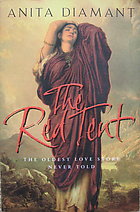Review: ‘The Red Tent’ by Anita Diamant
Author: Anita Diamant
Published: Pan Macmillan, 2002, pp. 386. Originally published 1997
Genre: Historical fiction
Blurb: Her name is Dinah. In the Bible, her fate is merely hinted at in a brief and violent detour within the verses of the Book of Genesis that recount the life of Jacob and his infamous dozen sons. The Red Tent is an extraordinary and engrossing tale of ancient womanhood and family honour. Told in Dinah’s voice, it opens with the story of her mothers — the four wives of Jacob — each of whom embodies unique feminine traits, and concludes with Dinah’s own startling and unforgettable story of betrayal, grief and love. Deeply affecting and intimate, The Red Tend combines outstandingly rich storytelling with an original insight into women’s society in a fascinating period of early history, and such is its warmth and candour, it is guaranteed to win the hearts and minds of women across the world.
When, where and why: This is yet another of my university charity shop acquisitions. I picked it up because a friend (the same one who recommended Pillars of the Earth, which didn’t exactly fill me with confidence after the fun I had with that) was writing her PhD on Jewish feminist literature and this was one of her texts. I read it now because I’m trying to read as many of my older books before the end of the year to clear them off the TBR pile, so this counts as book 29/50 for my Books Off the Shelf Challenge.
What I thought: The Red Tent instantly drew me in from its very first paragraph:
We have been lost to each other for so long. My name means nothing to you. My memory is dust. This is not your fault, or mine. The chain connecting mother to daughter was broken and the word passed to the keeping of men, who had no way of knowing. That is why I became a footnote, my story a brief detour between the well-known history of my father, Jacob, and the celebrated chronicle of Joseph, my brother. On those rare occasions when I was remembered, it was as a victim. (p. 1)
The narrative voice, that of Dinah, reminded me a lot of that of Margaret Atwood’s wonderful Penelopiad which I read last year. It was strong but slightly melancholy and conveyed the same idea of reclaiming the story of a marginal woman from a great male narrative, telling the story from a new, feminine perspective and revealing what ‘really’ happened.
Dinah’s observations made me realise how little I know about this part of the Bible (in fact, most of my knowledge comes from that dubious fountain of information, Joseph and the Amazing Technicolour Dreamcoat), so I thought I should probably have a look at the original story. The Bible story deals with the dishonouring of Jacob’s daughter when Sechem sleeps with her (rape in the Bible story and willing in the novel), but is mostly concerned with the actions of her male relatives and how this affects them. Aside from a mention of her birth, her life either side of this incident is never mentioned, so Anita Diamant’s story redresses the balance and fills in these gaps.
The red tent of the title is the separate tent set aside for the women where they go while menstruating to keep apart from the men. Leah explains to Dinah at one point:
In the red tent, the truth is known. In the red tent, where days pass like a gentle stream, as the gift of Innana courses through us, cleansing the body of last month’s death, preparing the body to receive the new month’s life, women give thanks — for repose and restoration, for the knowledge that life comes from between our legs, and that life costs blood. (p. 188)
The Red Tent then is a very appropriate title as the book focused almost exclusively on feminine concerns: becoming a woman, giving birth and finding a husband. I appreciated this insight into their secret world and I liked the idea of telling a masculine story to recentre it around the women, but I soon found that their preoccupations and interests were most definitely not my own. The book was well written, but unfortunately its focus wasn’t one that appealed to me and so I didn’t enjoy it as much as I expected. If marriage, babies and rites of passage are your thing though, this is probably a book that you would enjoy.
My only gripe with the book (after all, my lack of interest in giving birth is my fault, not the author’s) was that Dinah’s voice which comes across so stongly at the beginning of the tale quickly becomes lost in the story. Every so often it would resurface, and I loved it when that happened, but unfortunately these flashes of character were rare and a lot of the time I forgot that there was a first person narrator at all.
Where this book goes: I’m not quite sure what to do with this book yet. I think it will stay on my shelves for now, but it’s definitely earmarked for the next time I need to purge some books. Its days are numbered.
Tea talk: After the disaster of the Brazilian tea I decided to go back to an old favourite with this book and so I’ve been drinking my much-loved Milk Oolong. Sweet and comforting on a chilly day.

